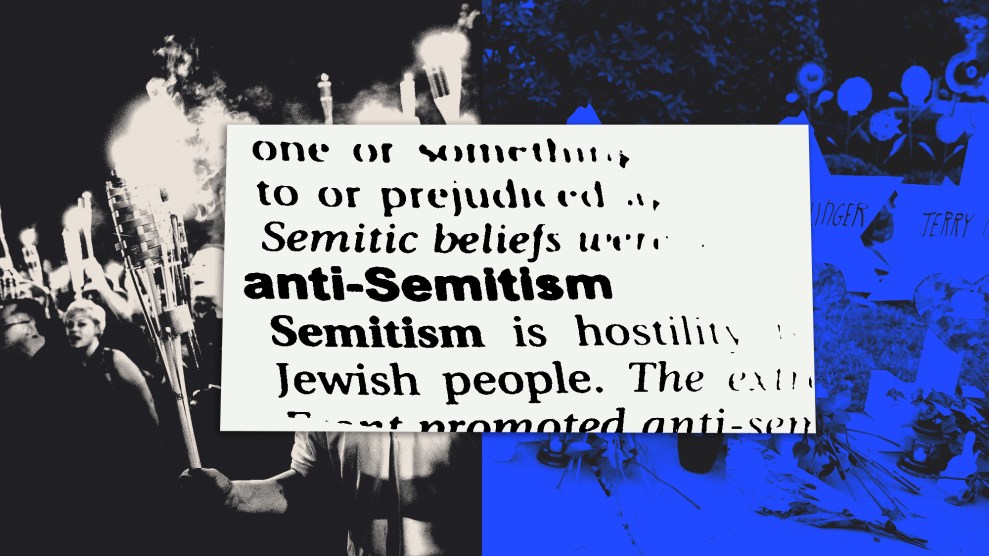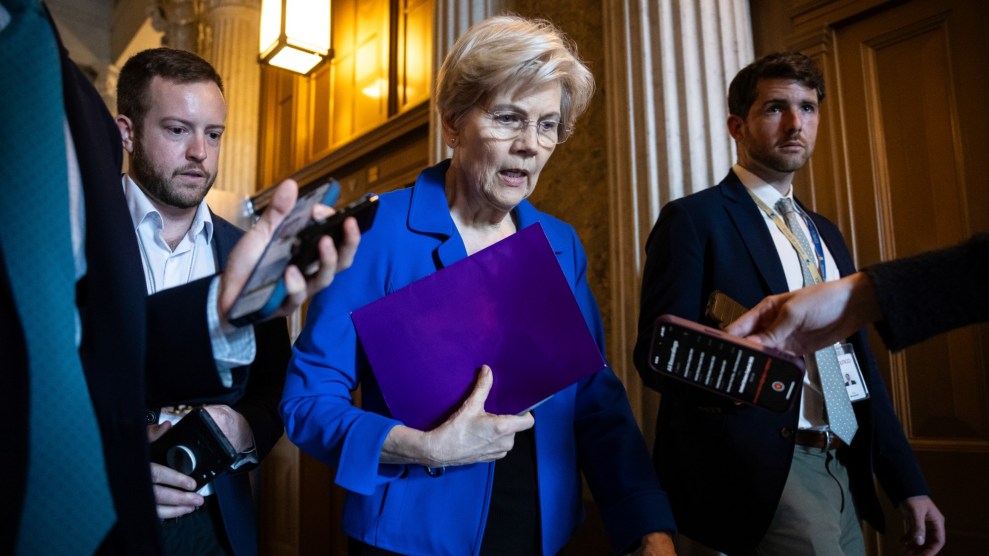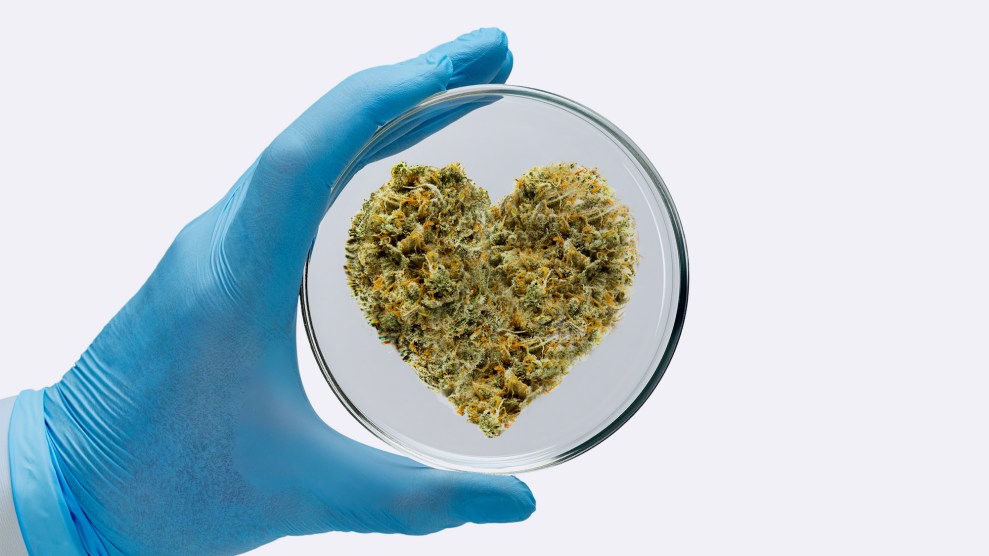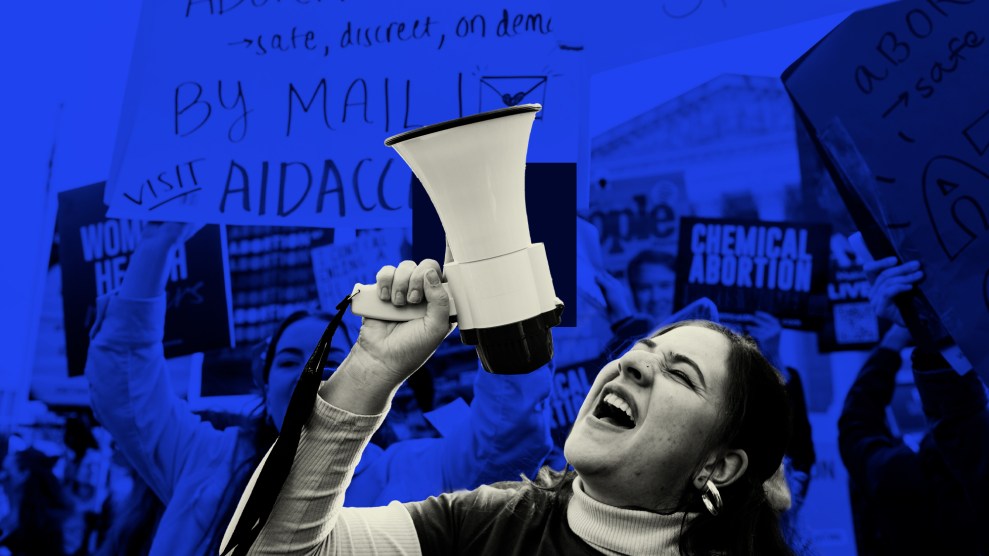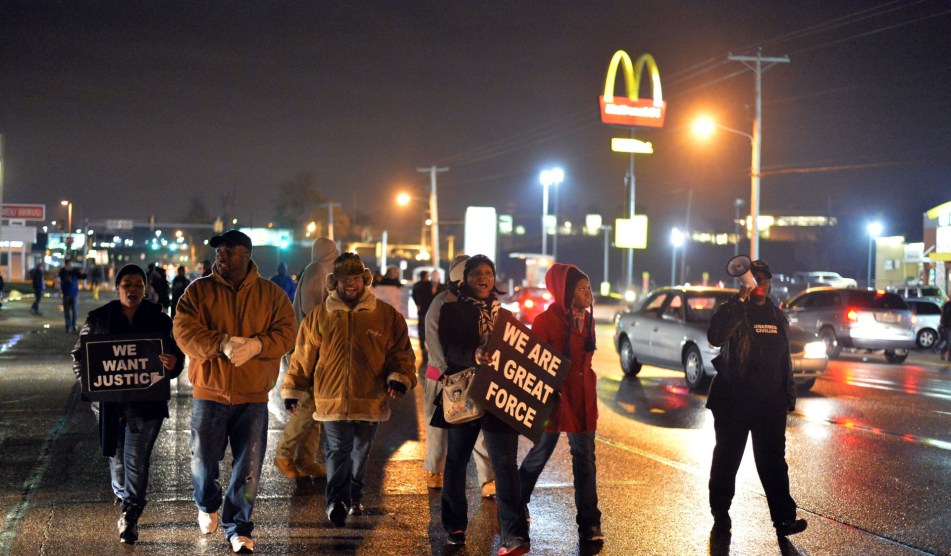
Demonstrators walk on a street shouting slogans to protest the shooting death of 18-year-old Michael Brown in Ferguson, Missouri in November 2014.Michael B. Thomas / Getty Images
In August of 2014, all eyes were on Ferguson, Missouri. The city’s mostly Black residents flooded the streets in protest after the shooting death of 18-year-old Michael Brown at the hands of police officer Darren Wilson. In the middle of the chaos, the fluorescent golden arches of a local McDonald’s promised sanctuary: Protesters bought bottles of milk there to soothe eyes burned by tear gas. Journalists used the restaurant’s Wi-Fi and electricity to send off their stories. The restaurant was a gathering space for a community in crisis.
This is the scene Marcia Chatelain sets in the opening of her new book Franchise: The Golden Arches in Black America. As Chatelain goes on to explain, McDonald’s has often found itself present for moments of conflict in African American history. McDonald’s first entered Black America in 1968, in the fallout from the assassination of Martin Luther King Jr. After the civil rights wins of the mid-1960s, the country’s leaders wanted to bring economic justice to Black communities in the country’s inner cities. Civil rights leaders and government actors alike pointed to Black business ownership as the answer. Enter McDonald’s, which was all too eager to offer its franchise model as a path to economic prosperity.
Thus began a long and complicated relationship between fast food and Black America. This history has been punctuated by moments of strife and of celebration, from the first MLK holidays, to racial uprisings in places like Watts and Ferguson. Fast food was offered to Black Americans as the solution for a variety of social ills—but the history that Chatelain lays out proves that it could never fully rise to that task.
“Even in a system that is supposed to be predicated on opening opportunity,” Chatelain says, “because that opportunity is done at the service of the health and wealth of people who have no privilege and very little voice, it will never create the types of things that it promises.”
I spoke to Chatelain about her book for a recent episode of Bite, our podcast about food and politics. Below is a version of the interview, edited for length and clarity. Hear the full version on Bite:
Driving around downtown Detroit or maybe Chicago, you kind of notice on a subconscious level that going from the suburbs to the city means seeing the golden arches. It kind of just becomes part of the landscape, but not in a very obvious way. How did you bring that to light?
Marcia Chatelain: McDonald’s has been in every part of my life. I grew up in the 80s, before there was a stigma on parents letting their kids eat fast food, so you just ate it all the time. And then in high school, fast food for me was a sign of my independence, being able to work after school, have my own money. This is where you hung out. And this was before cell phones, so there was a lot of coordinating rides and dropping off with parents at McDonald’s. And then in graduate school, I ate it all the time because I was working on a dissertation and had no money. So fast food has been with me for a very long time.
My curiosity about it is the fact that it’s so ubiquitous, and it’s such a fixture in so many people’s lives, that it’s hard for us to imagine a world without it—and imagine a world in which people were not entirely sure how they felt about it. And so I think in writing this book, I wanted us to have an opportunity to take a step back and say: “Getting people to eat fast food is a process; getting people to trust fast food is a process.” And how do those processes intersect with the realities we see today? And the racial disparities among people who consume fast food and bear the consequences of fast food?
What did the beginning of McDonald’s in Black America look like? What’s going on during that era?
The entry of McDonald’s in black America starts in 1968, after Martin Luther King’s assassination. The resulting chaos that followed his death created the conditions that folks like Naomi Klein write about in terms of “disaster capitalism.” So there’s this huge social upheaval, King’s assassination; there’s property damage, there’s violence; and then when the dust settles, everyone is looking around, like “What are we going to do now?” And the response from corporate America, as well as the government, is: If we are going to quell social unrest in black communities, we should develop these economic programs that pivot around business.
So you start to see a resuscitation of the ideology of black capitalism, because it does this thing that is so perfect for the time. It promises progress in the tune of civil rights. But it doesn’t challenge segregation. And it doesn’t challenge discriminatory lending from banks, or any of the critical issues of the day. It says that if you want to strengthen your communities, we will create these economic opportunities. And McDonald’s just sees the opening. They see white franchise owners no longer wanting to do business in black communities. They also see a federal government that is saying, “Listen, we tried civil rights for like all of five minutes, it didn’t work. So what we’re going to do is we’re going to pivot towards capitalism.” And so there’s a great deal of idealism and cynicism coming together. And then when you do that in the context of capitalism—nothing good happens.
Yeah. What really surprised me is that as all these forces are coming together, in a lot of different ways, McDonald’s ends up being the site of tension in the community. The idea that this history wasn’t terribly peaceful was a surprise to me. I’m like, why is everyone freaking out?
Everyone is freaking out, yeah! Because we think of business as this kind of clean entry and exit points in the market. But if we look at the long history of suppression of labor organizing, if we look at how food is harvested, if we look at the consequences of when people are stuck in low wage work—it’s all violence. But because it’s shiny, and because there’s good fatty foods, there’s a way that it’s all dulled. And so in thinking about McDonald’s engagement in Black communities, people often point to the philanthropy. They point to the advertising. They point to the fact that for many African Americans, they’ve become very wealthy. They’re working in McDonald’s corporate or having their own franchise restaurants. But getting there was a heavy lift, and a lot of communities weren’t having it.
Yeah, there are these pockets of resistance. The example I’m thinking of now is the Black Panther Party in Portland. It seemed like those people were trying to offer a different model of community uplift, but they came up against McDonald’s.
In places like Philadelphia, I talked about the Ogontz neighborhood, where they’re saying, “We don’t need another fast food restaurant. We don’t want McDonald’s here. No one asked us what we wanted. And we could use a mental health center and we can use a library and we need a place for kids to hang out. That isn’t a fast food restaurant.” The argument there is: “Just because we are a poor community doesn’t mean that we don’t believe that we can set the terms of what our lives are going to be like.”
And there’s something so deeply poignant about that because we also think today of resistance to McDonald’s as a sign of affluence, you know. It used to be if you could keep McDonald’s out, like in Martha’s Vineyard, then that’s ultimate sign of your wealth. Now, it’s like, Okay, if McDonald’s is going to be here, let’s make it taupe, or let’s make it look like a ski chalet. Right? And so, you know, to think about how, in the moment where there’s so much pressure to bend under the weight of black capitalism, there’s these communities that are like, let’s take a moment to really think about what we’re bringing into our communities. I felt like that needed to be remembered.
As recently as last month, there was a lawsuit filed against McDonald’s for racial discrimination. And so many of these fights and conflicts are continuing to this day.
These conflicts are part of that engagement since 1968. There is a long history of McDonald’s being actually a corporate leader in diversity within their corporate offices, but people feeling that there’s still a lot of inequality within it. These stories about these lawsuits expose what I was motivated by in writing this book: That under capitalism, even if some people are doing well, and even if there are black millionaires, capitalism will always starve even as it overfeeds.
Even in a system that is supposed to be predicated on opening opportunity, because that opportunity is done at the service of the health and wealth of people who have no privilege and very little voice, it will never create the types of things that it promises. And so these lawsuits are really fascinating to me because they’re not new. The question is whether or not these plaintiffs have an opportunity to actually open up the conversation about the limits of capitalism. If that was their goal. That’d be my goal.
You talked about all of the very real cultural ways that McDonald’s ingratiates itself to Black communities: McDonald’s big push for Martin Luther King Jr. Day and all of the philanthropic efforts that they made. So it’s like, McDonald’s is black—question mark?
It’s this thing that happens where, when you starve civil society from a complex and robust story of America, it opens up the space for corporations to do all of these things they have no business doing. And so we get to a place where, the first celebration of the Martin Luther King holiday, McDonald’s paid for a lot of it: the 1986 parade, the special exhibit at the Atlanta airport, the videos that I used to watch as a kid every January. I’m seeing Martin Luther King’s face and the Golden Arches. That’s wild. Right?
This is corny behavior of mine. Every few weeks or so I wake up early, and I listen to King’s last speech in Memphis the day before he is assassinated. And most people know the very end of it, because it’s so prophetic. He talks about the end of his life. But if you listen to the whole 45 minutes of it, he is tracing the story of human struggle. He’s starting in the Bible, but he’s talking about black economic power. But it isn’t black economic power so everyone can be super rich and that would be awesome. He’s saying that we have economic power in order to push institutions that are hurting us. So he talks about the sanitation workers strike—that’s why he’s in Memphis. And he said, up until this point, only the workers have been hurting, it’s time for us to also feel the pain. We want to bring that pain to Wonder Bread and Coca Cola. We have the power to starve corporations of the thing that they feed on, and in giving up these products and involving ourselves in economic boycott, we stand in solidarity with workers.
So you take all of that—and then it’s like his face next to the Golden Arches. It’s incredibly complicated. Why is McDonald’s the one doing that? It forces us into a position to believe that corporations are the ones who deliver these things. Rather than saying, how do we create alternative structures that are in the interest of the public good, where we can really edify our quality of life with art and activities?
I had a hearty chuckle at the Calvin ad, you know, where McDonald’s is literally selling audiences on the idea that “We are good for your community. Look at this respectable young man!” Which in itself is its own complicated and loaded image.
I say this as a person who teaches history: It’s so easy to present people in the past is like, “Oh, they’re so naive or like, why didn’t they know better?” Because they didn’t have the internet. We always know how that story ends. But from the perspective of 1970 and 1980, I don’t think people could imagine the calamities that were caused by low-wage work, stagnating wages, while the cost of living goes up. All of the kind of global branding mechanisms that would be brought into people’s lives beyond TV commercials—people didn’t know. But what they hoped for was that they would find these ways to kind of ease pain.
And so I am deeply critical of systems that suggest they can provide things that they’re not designed to. But I try to be as patient as possible. And understanding why people were so invested in this relationship, and why they felt like entering into some type of partnership with McDonald’s would help lessen the burdens that are caused by capitalism and racism. But you can’t solve that equation by using capitalism. It just doesn’t work.
There’s this idea that you consistently push back against throughout the book which is the idea that Black communities experience higher levels of high blood pressure and stroke and heart disease and things like that, and the solutions have always been in individual choices: Just eat less fast food.
If I hear one more person tell me about how, “Oh, I run this nutrition program and I’m trying to tell people to eat kale.” Okay, yes, I get it. You should eat kale maybe, and not french fries. But french fries are awesome. Kale is good for you. I get it.
But I want there to be a food justice movement that does not work to indict people in their choices, but says we need to mobilize against all of this kind of structural stuff that limits people’s choices and constraints them. When you are telling someone to eat kale, I want you to ask them: Do you have a consistent source of electricity in your home? Can you keep that kale fresh? And if the person says, “sometimes I can’t pay my light bill,” then I want you to take a step back and say, “Okay, what are we going to do about the wages? What are we going to do about predatory utility issues?” Like these are the structural reasons why fast food wins.
I’ve been asked on this tour quite a bit, “So do you think that every business in a black neighborhood should be a black-owned business?” I really don’t care. Because business cannot do anything for us. Business’s job is to maximize profits. Our job as people is to maximize our capacity to meet each other’s needs. Let the business sell their burgers, but they cannot set the tone of the possibilities for people’s lives.







